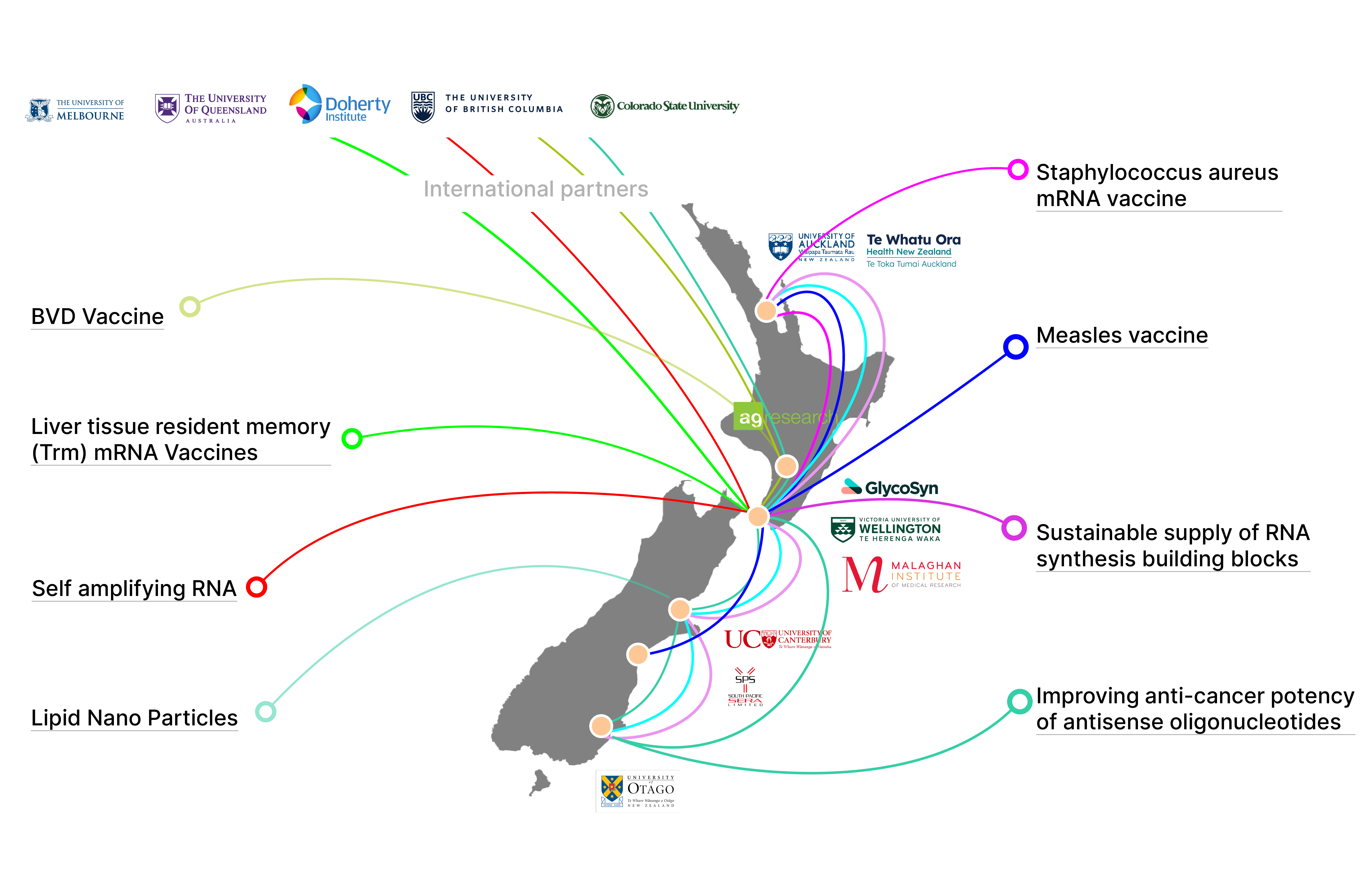Fast Start Projects
a set of highly collaborative research projects that can immediately build capability for the platform
What is a Fast Start project?
RNA Platform Fast Start Projects are a set of highly collaborative and reasonably mature research projects that immediately build capability for the platform. These projects are characterized by their rapid mobilization, aimed at addressing specific goals or opportunities efficiently. The projects encompass a diverse range of areas within RNA research, including the development of mRNA vaccines, exploration of disease drivers, formulation of RNA therapeutics, and the synthesis of critical reagents for the RNA Platform.
The Fast Start Projects are agile, goal-oriented endeavours, aligned with the RNA Platform's commitment to quick decision-making, innovation, and impactful outcomes. These initiatives involve multidisciplinary efforts, engaging various teams and researchers, and play a crucial role in advancing the capabilities and objectives of the RNA Platform within a relatively short timeframe.
The key criteria for Fast Start projects are:
- Well established team and collaborations
- Equipment and infrastructure in place
- Proof of concept experiments complete
- Project already has had significant funding
- Immediate requirement for research grade RNA production (up to 10mg in total)
- Preliminary market/competitive intelligence completed
- Special relevance to Māori
- Will lift and test capability in multiple pillars
- Project will result in benefit or assets for the Platform

Currently, we are in the contracting phase to ensure a seamless alignment with the platform's objectives for each selected project. Anticipating the next phase, successful teams will be supported with funding ranging from 200k to 300k to expedite activities in line with the platform's strategic goals. Moreover, each chosen group will receive essential RNA constructs from our advanced manufacturing facility.
This initiative marks a significant stride in advancing impactful research within the RNA community. We look forward to witnessing the positive outcomes resulting from these collaborative efforts.

Measles vaccine
This project focuses on developing an mRNA vaccine as an alternative to the measles, mumps, and rubella (MMR) vaccine, specifically tailored for individuals susceptible to severe viral infections from live attenuated vaccine viruses. The research team has observed promising results, including robust neutralizing antibody titers against SARS-CoV-2 in patients who received mRNA vaccines. They have also developed a prototype mRNA measles vaccine, demonstrating its ability to stimulate immune responses.
The goal is to refine the vaccine design for optimal immunogenicity, efficacy, and GMP production. The mRNA measles vaccine could be a vital alternative for individuals ineligible for MMR, such as pregnant individuals or infants, addressing a critical gap in vaccination coverage.
Improving anti-cancer potency of antisense oligonucleotides
This project focuses on advancing RNA therapeutics for triple-negative breast cancer (TNBC) by enhancing the chemistry and formulation of an RNA therapeutic, targeting a highly cancer-specific long non-coding RNA. The lead antisense oligonucleotide (ASO) has shown superior efficacy to chemotherapy in vivo.
The goal is to overcome systemic delivery limitations to solid tumors by improving ASO targeting to cancer cells, potentially widening the therapeutic window. The project explores three approaches: modifying ASO properties through conjugation, encapsulating ASOs in lipid nanoparticles, and formulating them into polymer matrices for efficient intracellular delivery.
The interdisciplinary team has developed analytical synthetic chemistry techniques for ASO production and purification, bio-conjugation chemistries, and encapsulation into LNPs. Rigorous testing of new compounds in vitro and in vivo will guide the development of the most promising formulation-targeting approach towards first-in-human trials. This initiative is expected to generate valuable knowledge and intellectual property applicable to various cancers.
Self amplifying RNA
This project focuses on leveraging synthetic mRNA as an ideal platform for prophylactic vaccinology, specifically targeting malaria infection. The team has concentrated on linear mRNA vaccines, publishing a Nature Immunology manuscript detailing novel adjuvants that enhance protection against malaria in pre-clinical models. Their current vaccine, a lipoplex administered intravenously, triggers a resident-memory CD8+ T cell response in the liver. Now, the team is actively transitioning to an LNP vaccine for ease of administration and proven efficacy. Interestingly, they observed differences in liver Trm-inducing capacity between different methods of mRNA preparations, indicating that intrinsic properties of the transcribed mRNA are involved in defining T cell phenotype.
The project is now exploring the use of self-amplifying mRNA (SAM) in their vaccine program, capitalizing on its dsRNA intermediate, which may stimulate the innate effector response crucial for efficient Trm induction.
Sustainable supply of RNA synthesis building blocks
This project is part of an ongoing MBIE Endeavour antiviral drug development program, focusing on the preparation of known and novel nucleosides, C-nucleosides, their triphosphates, phosphoramidate prodrugs, and phosphoramidite building blocks for DNA/RNA synthesis.
The Ferrier Research Institute, serving as national experts in the synthesis of these materials, recently filed a PCT patent application for a novel method enabling the rapid production of triphosphate analogs at a gram scale. During the COVID pandemic, this method was instrumental in generating nucleotide triphosphates for PCR kits developed entirely in New Zealand. These materials are crucial for IVT and solid-phase oligonucleotide synthesis, serving as critical reagents for the RNA SSIF platform.
The project aims to expand synthetic capabilities and collaborate with on-site cGMP manufacturer GlycoSyn, ensuring the translation of methodologies toward GMP-quality materials. The goal is to collaborate with other pillar leads to secure a robust and sustainable supply of critical reagents for the success of the mRNA Platform.
BVD Vaccine
This project tackles Bovine Viral Diarrhoea (BVD), a highly contagious disease causing significant economic losses in the livestock industry. Existing BVD vaccines exhibit unreliability, especially against the prevalent BVDV strain in New Zealand.
The team's approach involves identifying conserved immunogenic BVDV E2 sequences, modifying the mRNA encoding E2 using established techniques, testing RNA stability and translation efficiency, formulating the mRNA in "standard LNP," and evaluating candidate vaccines through calf immunization and immune response assays.
Led by multidisciplinary teams, this study aims to provide a proof-of-concept for the application of RNA vaccines in livestock, offering a potential breakthrough in addressing the challenges posed by BVD.
Staphylococcus aureus mRNA vaccine
This project revolves around a fusion protein vaccine targeting three conserved secreted virulence factors of Staphylococcus aureus, a major bacterial pathogen affecting humans and livestock. Vaccinated mice exhibited specific immune responses and significantly reduced tissue burden after S. aureus exposure. To develop a vaccine covering major S. aureus strains, requiring multiple protein variants for each component, the team utilizes mRNA technologies for a fast-track approach.
In conjunction with collaborators at RiboPro, the University of Kent, and Kings College London they have undertaken extensive comparisons of mRNA sequences, including codon optimization, UTR variations, modified uridine, and glycosylation and identified a non-reactogenic mRNA sequence that is highly immunogenic in mice. Despite effective in vivo delivery, mRNA-vaccinated mice couldn't control S. aureus infection as effectively as the protein vaccine.
The next steps involve engineering immune-stimulating properties directly into the mRNA sequence and exploring alternative LNP formulations to elicit the necessary immune response against S. aureus.
Liver tissue resident memory (Trm) mRNA Vaccines
This project focuses on liver Trm-Inducing mRNA-LNP vaccines, a groundbreaking approach with potential applications against diseases like malaria, hepatitis, and liver cancer. Their current findings indicate that the manufacturing and/or purification methods used to produce the mRNA product significantly influences immune responses, particularly in inducing liver Trm.
Using scalable FPLC methods, including ion-exchange chromatography, the team have developed methods to fractionate mRNA produced from the in vitro transcription reaction. Here, the team will identify Trm-inducing factors and develop new protocols to produce highly pure mRNA. Critical next steps involve establishing sensitive HPLC analytical methods, characterizing minor mRNA components based on LCMSMS and nanopore sequencing techniques whilst investigating their impact on Trm production, immunogenicity and reactogenicity.
A generalizable output from this project will be the development of best practice mRNA purification and analytical protocols. This project strives to advance vaccine technology and manufacturing methodologies for more effective and targeted immune responses
Lipid Nano Particle Chemistry
This project is dedicated to the development of novel ionisable Lipid Nanoparticles (iLNPs) for the encapsulation and delivery of RNA, a critical aspect for mRNA-based vaccines and therapeutics.
Addressing the cost and licensing challenges associated with current iLNP technologies, the team is creating new ionisable lipids (ILs) to enhance manufacturing opportunities, reduce costs, and increase supply chain resilience. They have successfully produced over 100 mRNA-iLNP vaccines for diseases like COVID-19, malaria, and hepatitis B, establishing manufacturing and performance parameters using industry-validated ILs and iLNPs. Prior design, synthesis and testing (~25 novel ILs) resulted in the discovery of 6 lead scaffolds that demonstrated equivalence or better when compared to industry standards in preclinical assays, validating their knowledge-based approach. The next steps involve SAR studies for each scaffold (optimisation), developing freeze-dried mRNA-LNP formulations, testing in preclinical models, and considering scale-up and toxicity studies.
This project aims to advance RNA delivery technology, making it more cost-effective and versatile for vaccine development.

